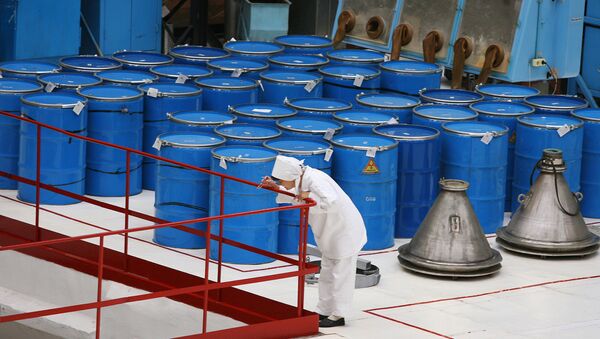MOSCOW, September 29 (RIA Novosti) — Russia in one of the world leaders in nuclear technologies and nuclear security, a leading engineer of the International Atomic Energy Agency (IAEA) and a visiting professor at Imperial College London, Michael Ojovan, told RIA Novosti Monday.
“One of the leaders is the Russian Federation. Russia is a leader in many areas of waste management, cementing technology… in vitrification of ceramic materials,” Ojovan said at a press-briefing at Rossiya Segodnya International Information Agency.
At the briefing within the framework of a joint IAEA and Moscow State University (MSU) conference on nuclear security the professor also said that MSU professors are the authors of many books and articles in the sphere.
Commenting on the role of the agency in monitoring security at nuclear facilities, Deputy Director General of IAEA Alexander Bychkov said that IAEA does not monitor security on nuclear facilities but “the transfer and use of nuclear materials.”
“However, each country has the right to invite [IAEA] experts on this or that specific field… This includes checking the safety of nuclear stations, checking the regulatory body that monitors these stations,” Bychkov said.
NUCLEAR WASTE IS ‘NO PROBLEM’
Speaking on nuclear waste, the deputy general director of IAEA said that this issue is often seen as “problematic and very dangerous.” At the same time, he added that “there is no problem of nuclear waste today… there is a set of solutions that can be used in any country by any company to protect people and the biosphere from radioactive waste.”
According to Bychkov, IAEA tried to show diplomats and leaders responsible for the decisions in the spheres of nuclear energy and nuclear security, that the nuclear waste issue is currently solvable.
UKRAINIAN NUCLEAR FACILITIES
The deputy general director also spoke of nuclear security in the context of the Ukrainian crisis. He said that despite the ongoing conflict, “IAEA as an agency has no complaints to Ukraine in terms of safety and nuclear energy.”
He also called on the journalists not to politicize the questions at the press briefing. IAEA, according to Bychkov, works on a uranium supply assurance to make sure every peaceful nuclear facility has a guaranteed supply.
As for the ideas of certain Ukrainian politicians to change the supplier for domestic NPPs (nuclear power plants), he said that while the wish to find a second supplier is “normal”, no NPP operator will ever use another fuel, which is not meeting the special standards of that very plant.
PERSONNEL PROBLEM
The key issue in maintaining and operating nuclear facilities is the personnel issue, as Bychkov said. As the majority of the NPPs of the first two generations were built in 1970s and 1980s, the majority of the professionals who started their work at these plants are now going to retire.
In addition to that, while an ordinary energy plant needs a bunch of well-educated and prepared engineers, a nuclear plant needs “tens of engineers”, the deputy general director said.
The International Atomic Energy Agency, the world’s center for cooperation in the nuclear field, was created in 1957 and reports to the United Nations General Assembly and Security Council. The Agency with the headquarters in Vienna seeks the promotion of peaceful use of nuclear energy.
The joint IAEA-MSU conference, which takes place in Moscow and is held on September 22 – October 3 involves 70 nuclear cycle specialists from Russia and CIS countries and is devoted to the issues of nuclear waste management.




